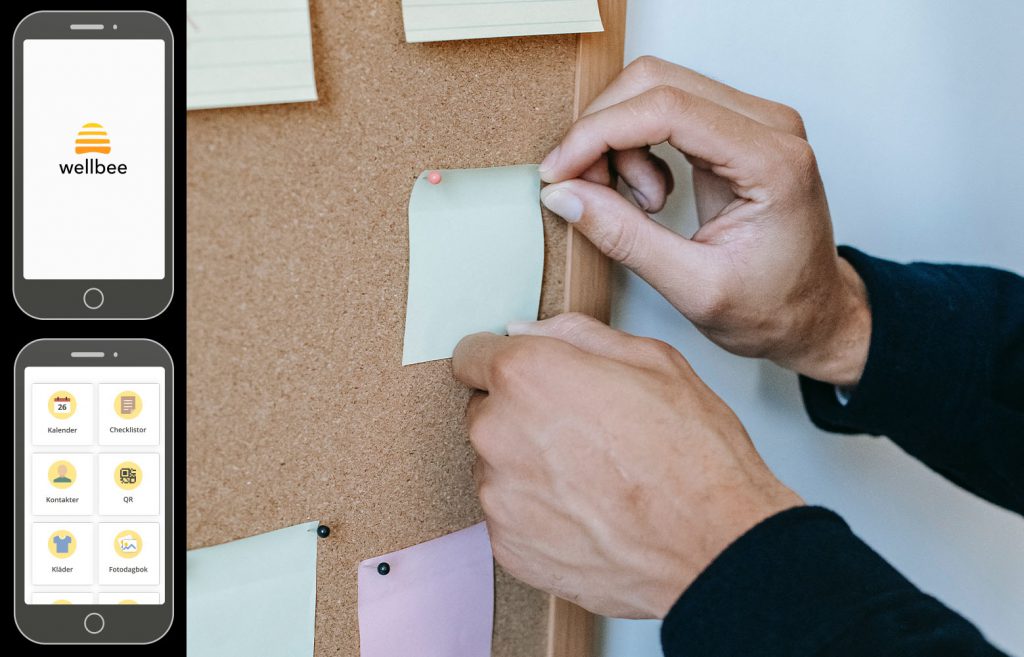Wellbee is an app that provides support in everyday life for people with cognitive challenges. The service is already available in around 20 municipalities – the foundation was laid via an innovative procurement in Karlstad municipality.
Four years ago, the Department of Functional Support in Karlstad municipality started looking for an app that could support users who wanted to be more independent in everyday life. It simply did not turn out.
- We probed the terrain and there were many apps on the market, everything from how to cope at home to how to take the bus, but no connected tool, says Ann-Sophie Gustafsson, business developer at Karlstad Municipality.
- The need was a digital, cognitive support for the users that enables them to be more independent. Nobody wants to walk around with a big stack of paper to remember things. They want to be like everyone else.
New type of procurement
The task became a sub-project in the initiative SOL, Support Quality of Life, where Compare led a process to allow suppliers to come up with different solution proposals. Karlstad then proceeded with an innovation procurement – the first in the municipality's history.
- We did not define what we wanted, but informed about the need. The municipality was responsible for SEK 500,000 and the rest of the costs had to be borne by the companies that wanted to participate as their own risk-taking, says Ann-Sophie Gustafsson.
More than 30 companies showed interest and eight went on to submit tenders. It was Frost who won the tender and together with the municipality they started the development work. At the beginning of 2019, Wellbee was put into operation.
The app is based on a calendar function that adapts to the person's ability to receive information. It is adapted for each user and can, among other things, give tips on clothing according to the weather, manage grocery shopping lists or communicate with relatives and staff. Communication can take place in text, but also via images or videos depending on the user's needs.

Wellbee is currently used by around 120 people in Karlstad, mainly within LSS, and the service has been procured by almost 20 other municipalities. Karlstad has also been a reference when new functions were developed, for example when the service was adapted for elderly people with dementia.
Paying tribute to the municipality's work
Toste Junestrand, CEO of Wellbee, believes that Karlstad's way of working to solve his need was decisive for the creation of the app.
- They had done a great needs investigation and a requirements specification about what was good and not so good about the products that were already on the market. We hadn't thought of this idea ourselves, but had been inside and touched a bit on the area when we developed an app for wheelchair taxis.
Wellbee is now in the starting pits for an international launch. Not least as support for relatives of the elderly, Toste Junestrand believes that the need can be great, both in Sweden and abroad.
- There are so many cases where the family is expected to take care of their relatives, where Wellbee can be a good support.
Model municipality for new technology
In Karlstad, there have so far been no more pure innovation procurements. On the other hand, several function procurements, where the municipality has been involved in testing new welfare technology. Karlstad has also been named one of ten model municipalities for new welfare technology by SKR, Sweden's Municipalities and Regions.
- A task there is to break new ground, create arenas and enable new technology for the citizens, says Ann-Sophie Gustafsson.
There, she also thinks that DigitalWell Arena has an important role in creating contact surfaces between the public sector and the business world:
- Having a market dialogue and exchanging ideas is not dangerous. In the public sector, we sometimes do not believe that it is not allowed without an agreement. This does not mean that you guarantee any deals, but it can give the market new ideas.

